Twelve Kingdoms: But For You, Four!
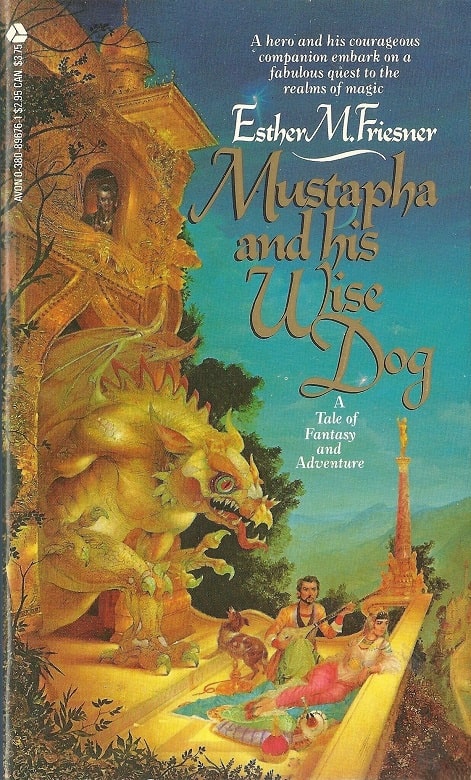 |
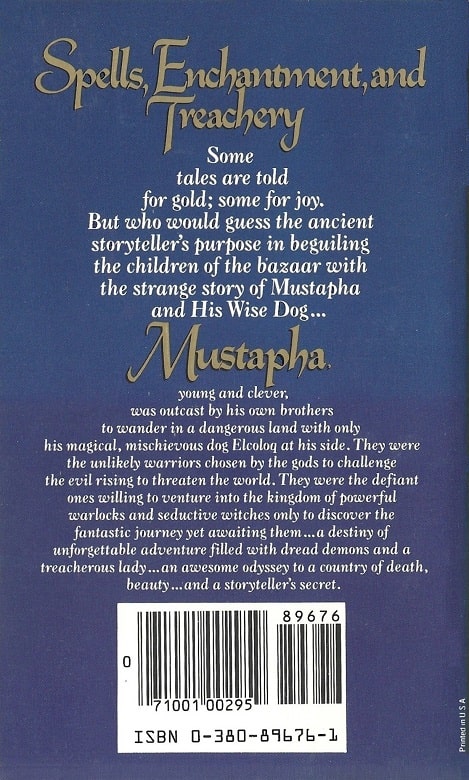 |
Mustapha and His Wise Dog (Avon, July 1985). Cover art by Richard Bober
You always remember your first time.
Indeed you do, even when it’s actually your second time, but we’ll get to that.
My first novel to see print was Mustapha and His Wise Dog, a fantasy set in the world of the Twelve Kingdoms. The series got its start when I should have been doing my homework. I blame my friend Shariann Lewitt (a.k.a. S.N. Lewitt). Picture it: Yale University, the 1970s. We were both a part of a group of friends who ate together in the dining room of the Hall of Graduate Studies. We might have come from different departments (Spanish, Linguistics, Computer Science, Philosophy, to name but a few) or even different schools (Shariann attended the Yale School of Drama) but we enjoyed each other’s company and became the self-dubbed Stream of Consciousness Table.
Don’t ask.
[Click the images for kingdom-sized versions.]
Anyway, one day I came to the table to find Shariann writing something on a yellow legal pad, so of course I asked what she was doing.
“I’m building a world.” That might not be an exact quote, but there’s the gist of it.
She went on to explain that she was writing a fantasy novel and thus building the world in which it was to be set. Hmmm. Interesting. Sounded like fun. Maybe I could–?
That’s how I found myself drawing maps and making all the world-building notes for my own fantasy novel. This was done mostly during classes when my note-taking should have been on the actual subject being taught. Oh well. Let’s call it multitasking, observe that I did receive both an M.A. and a Ph.D. from Yale (Spanish), and move on. Kids, don’t try this at home! Or in school.
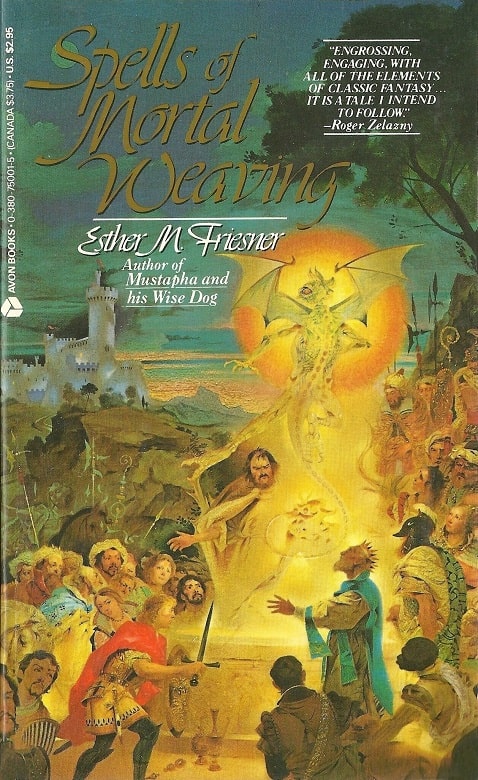 |
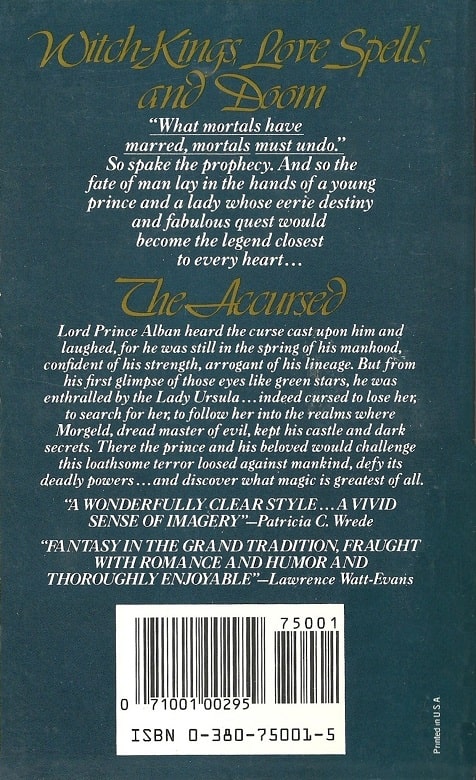 |
Spells of Mortal Weaving (Avon, May 1986). Cover art by Richard Bober
At the time, someone at our table began telling us about the Society for Creative Anachronism. Come to think of it, that might have been Shariann again. Everyone thought it sounded like a great idea and wanted to participate.
Everyone but me. I was still a bit of a shy and retiring type and was prepared to look askance at a bunch of people dressing up in costumes to pretend they were living in the Middle Ages. Long story short, I got over this with a vengeance and became a great fan of the SCA, even getting an Award of Arms, but at the time I remained on the sidelines, a skeptic.
I stood by while my friends created their S.C.A. personas. I stood by to give fashion advice when we all went to the fabric store. (Helping a six-foot-fourish male friend make good fabric/color/pattern choices for his ankle-length Viking d/r/e/s/s tunic was the high point of the expedition.) And then I nabbed said personas and pressed them into service in my first Twelve Kingdoms novel, Voyage from Cymweh.
That was not the title under which it eventually saw print, and probably a good thing, too. Even I wasn’t sure of how to pronounce Cymweh. Don’t bother asking where I got such a name, either. My Muse is weird, whimsical, and cannot be reached for comment on the subject at this time.
Somewhere in the process, I too joined the S.C.A., so I was among the merry throng of characters now inhabiting the Twelve Kingdoms. But here’s the thing of it: Many writers will tell you that there comes a point in the creation of a story where the characters stop being the author’s creatures and assert their own reality. They let the author know that they would not do some of things said author is trying to compel them do because it goes against the essence that very author gave them. They have independent life. The author can guide them, but forcing them to do something literally out of character? Bad idea. It can change a fascinating tale into a poorly done puppet show.
Thus my story soon left my-friends-and-me-in-costumes far behind while the characters I’d built around us took charge of their own actions, choices, and lives in general. (I do recall telling one of my friends, “You know that character I based on your SCA persona? Well, I had to kill you, but you died nobly!” To which he replied, “Wow, nobly? How out-of-character for me.”)
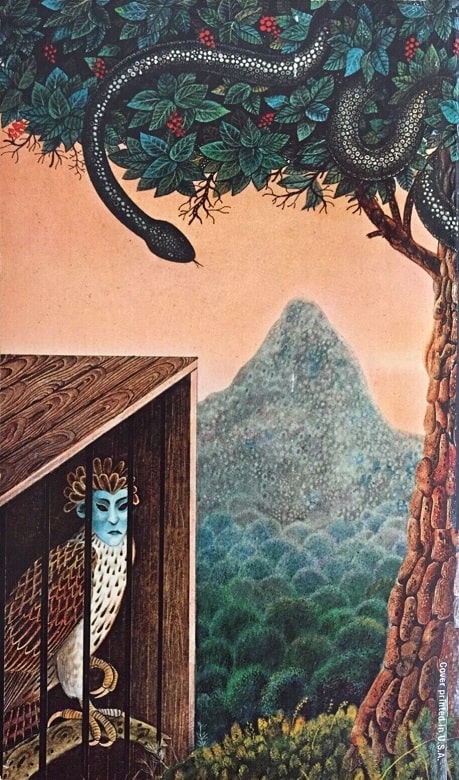 |
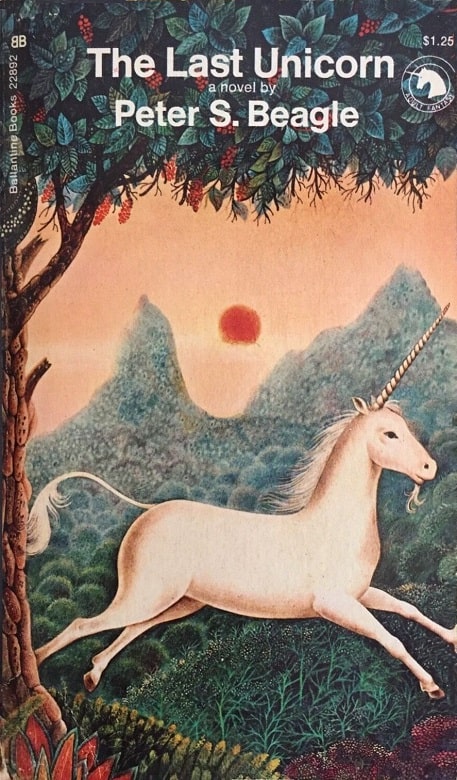 |
The Last Unicorn by Peter S. Beagle (Ballantine Books, 1969). Cover art by Gervasio Gallardo
Now a few words about my literary influences when it came to writing these books: Peter S. Beagle and James Branch Cabell. Regarding the former, when I was in college a friend of mine was told to read Beagle’s gorgeous novel, The Last Unicorn. She then passed along the good word to me. I was enraptured. It remains a gem that I re-read with unabated pleasure. I may never achieve Beagle’s mastery of language, but I’m okay with that. (By the way, we’ve met and I must say he’s definitely one of the Good Guys. A thoroughly delightful, down-to-earth, fun person to know.)
I’m going to let you go look up James Branch Cabell for yourself. I’m just going to say that I began reading his work with Jurgen and went on to spend even more time when I should have been studying Spanish literature ensconced in the stacks of Sterling Memorial Library, devouring all of his works in Yale’s possession. This included the piece he wrote after one or more of his books got banned in — dramatic pause — New York. Not button-down Boston but New ever-lovin’ York City.
It was a different time and a lot stodgier one.
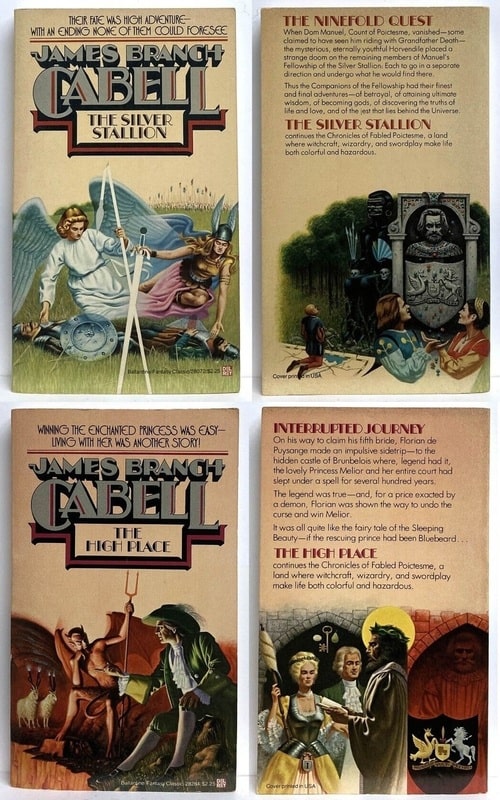 |
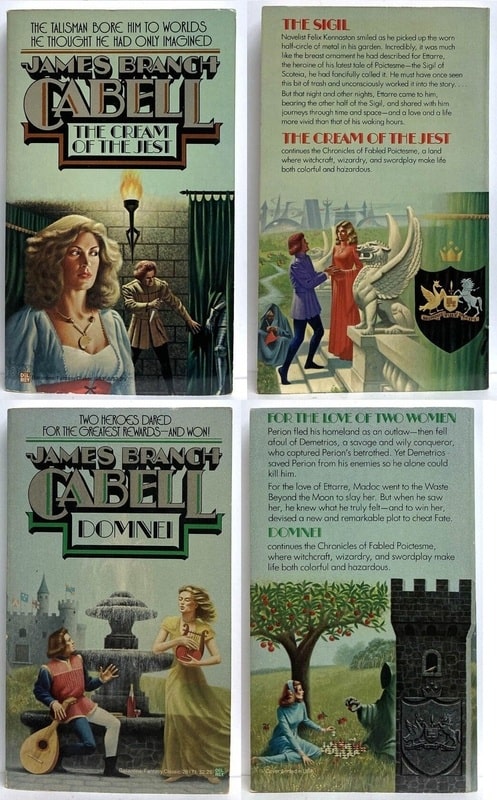 |
Four novels by James Branch Cabell: The Silver Stallion, The Cream of the Jest,
The High Place, and Domnei (Del Rey, 1979). Covers by Howard Koslow
What I picked up from his work and took home to mine was the puckish impulse to salt a story with word play, including anagrams. Case in point, his Philistines worshiped three gods: Ageus, Sesphra, and Vel-tyno. Easy names to unscramble, right?
Oh, come on, yes they are! You’re not even trying.
To a lesser degree, I did the same, especially with the proper names of characters and places. (Back to Spanish class we go, where I read Cervantes’ story, “El Coloquio de los Perros,” in which a man recuperating from treatment for venereal disease awakens in the middle of the night to hear two dogs talking about their lives. When I wrote Mustapha and His Wise Dog I named the talking dog Elcoloq. Sometimes the jokes are so private that I’m the only one who gets them.)
As I wrote more in the world of the Twelve Kingdoms, I decided that I wanted to create a twelve book series set there. Twelve kingdoms, twelve books, very logical. I set down plans for each book as I worked on individual volumes. My characters and their descendants made it known that they wanted to become part of an epic story, each adding something to the development and ultimate climax of the series.
On the other hand, I wanted to keep the first books in the series as standalones. No cliffhanger endings. Few things are more frustrating to readers — myself included — than being left dangling by our fingertips only to have the author, for whatever reason, be unable to deliver the next book with its thrilling conclusion.
On the other other hand, I do appreciate a good cliffhanger if the whole series is finished before I become involved reading it. (Looking at and thanking you, J.R.R. Tolkien.)
By the time things were ready to go to market, I had several completed novel manuscripts ready to make the rounds. Sheer happenstance caused the second book of The Twelve Kingdoms — Mustapha and His Wise Dog, for those of you who’d like a reminder — to be accepted for publication first.
There’s a story about why it was bought, but don’t ask me to verify whether it’s true or just… a good story. It goes thus: When the editor who bought the book saw the title they were rumored to have said, “Thank God, not another cat book!” and sent a contract. The rest is publishing history.
The fact that the first books were standalones meant that their order of publication didn’t affect continuity. Yay!
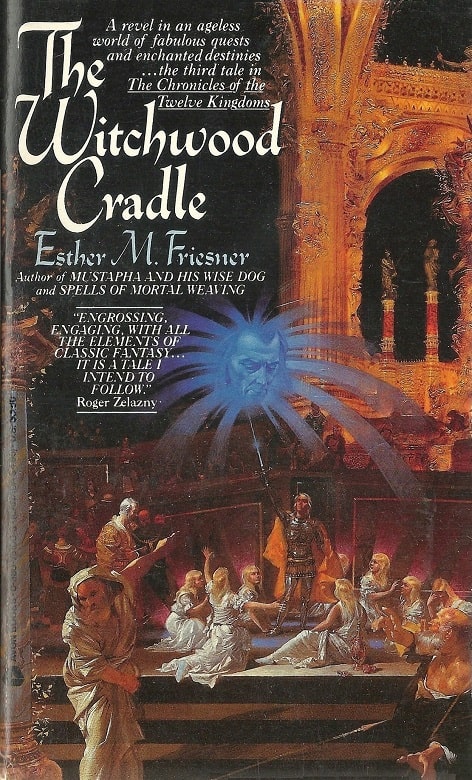 |
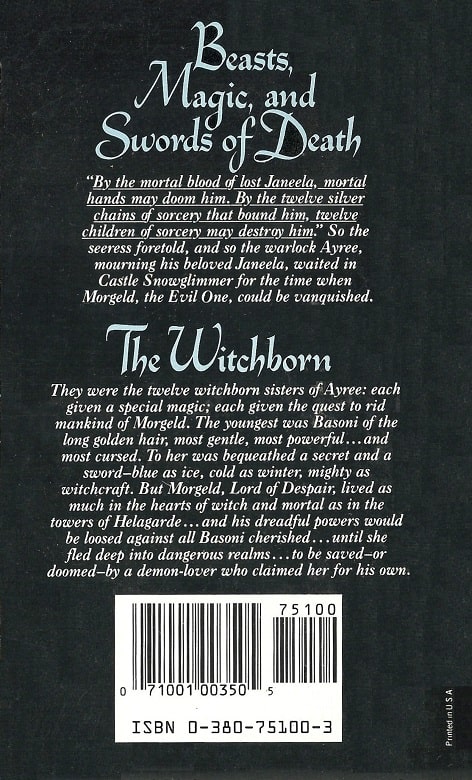 |
The Witchwood Cradle (Avon Books, March 1987). Cover art by Richard Bober
The next book to see publication was my first, Voyage from Cymweh, now sailing under its new colors, Spells of Mortal Weaving. This in turn was followed by The Witchwood Cradle and finally The Water King’s Laughter.
Finally indeed. No further books in The Twelve Kingdoms series were purchased. Alas.
(Spoiler Alert: I got over it. Thus far I’ve had forty-one novels plus a few over two hundred shorter works published. This has been a great comfort to me in mine old age and has kept me out of the local dives and pool halls.)
When I attend conventions and am called to participate on panels I like to share my view that writing is both an art and a craft, but it is also one more thing: It’s a business. (That is, it’s a business if you want to have your work published. I have no beef with Emily Dickinson and her spiritual descendants, nor with anyone who is content writing just to be writing for themselves. Do what makes you happy, please. We all need our chosen paths to joy.) No matter whether you are traditionally published or self-published, it’s still a business. I have yet to encounter the writer who would say No to receiving payment for their work.
(Note: Sometimes we do write pro bono. Behold, you are reading even now a composition for which I have received no remuneration, not even a modest bottle of Grey Goose. I give and I give and– ! Er, anyway, this was my choice, but trust me, it is not one I make frequently. Cha-ching!)
Conventional publishers like money too. Thus they make business decisions about whether or not to buy an author’s next book depending upon how well said author’s present book is selling. This is what we call The Numbers, and The Numbers loom large for all of us ink-stained, er, toner-stained, um, electron stained(?) wretches.
And there you have my origin story for the one-third of the Twelve Kingdoms series that did see daylight. But before I leave, I’d like to share one last anecdote with you. It’s about how sometimes real life is even better than fantasy for sending our expectations toppling.
Picture it (again): It’s now the 1980s and the first three of the Twelve Kingdoms books have been published. Having found and harnessed my Inner P.T. Barnum, I have thrown myself into the wonderful world of self-promotion by setting up signings throughout the still-thriving world of brick-and-mortar bookstores. Telling you about some of the hilarious/cringe-y things I experienced at such events would take a whole ‘nother article, but I think I’ll pass on that.
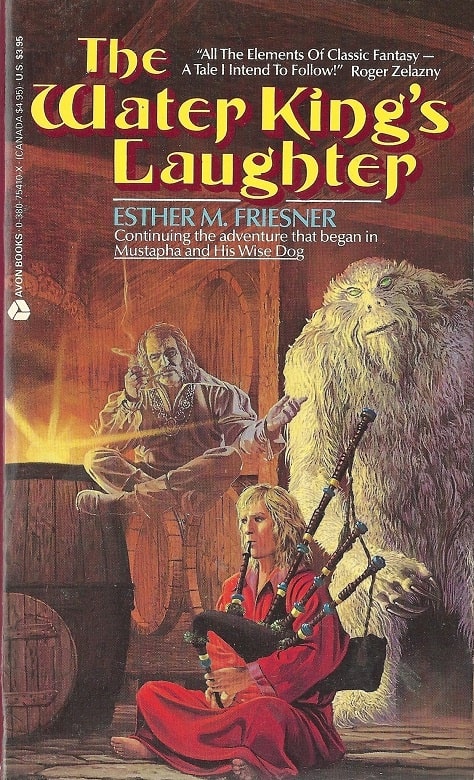 |
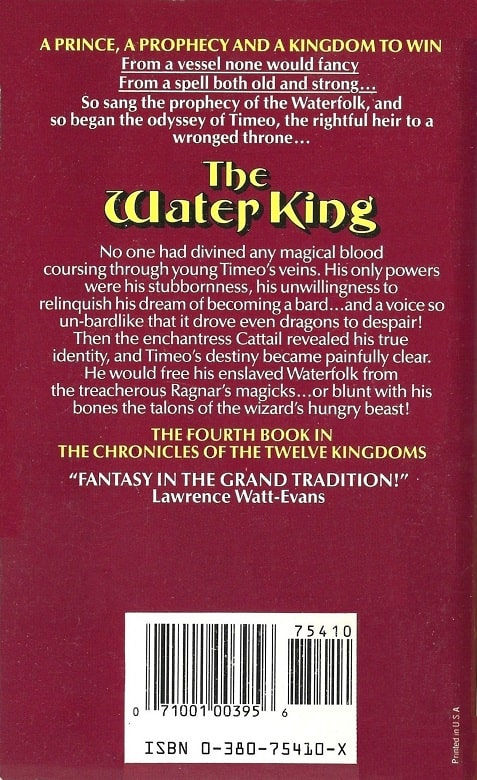 |
The Water King’s Laughter (Avon Books, October 1989). Cover art by Keith Parkinson
Instead, let’s see me behind my table in front of a bookstore in a large shopping mall very near a city with a significant number of Navy and Coast Guard members.
Wouldn’t you know it, here come a couple of nice young men who are in uniform. One looks at the books displayed on my table and says (more or less, it being that long ago), “You know, I read The Witchwood Cradle, and I’ve got a bone to pick with you.”
Uh-oh.
My mind freezes in panic because that book contained a battle scene. The closest I ever got to a battle was Nope. I did my research and then I did my best to make that scene work, but here’s a man who has studied of not experienced battle about to tell me exactly how badly I loused up a key scene in the book and there is nothing I can do except smile and pray for the floor to open up and swallow me in my humiliation.
I smiled. Weakly. I said, “What’s that?”
(Spoiler Alert off the starboard bow, folks! That is, if you can ever find the book in question nowadays.)
To which he replied, “Why did you let her [the heroine] marry him [the villain]? She was too good for him!”
After I picked my jaw up off the floor, I realized that the best bits of life, like the best bits of reading or writing books, mean encountering something you weren’t expecting, which is even better if it’s something that knocks your former assumptions all of a heap and vastly improves the way you view, well, just about everything.
It can even make every time a wondrous first time. Enjoy it for what it is, not what you assumed it had to be, and do it with all your heart.
Nebula Award winner Esther Friesner is the author of numerous novels and short stories, including the Princesses of Myth series, the Chronicles of the Twelve Kingdoms, and the Majyk trilogy. Educated at Vassar College and Yale University, she is also a poet, a playwright, and the editor of several anthologies. She is married, is the mother of two, harbors cats, and lives in Connecticut.
So sorry to read that your shameful literary career has barred you from local dives and pool halls. Maybe bringing a few copies of Chicks in Chainmail will get you in the door? We can but hope.
Nice to read of your literary influences Peter Beagle and James Branch Cabell, even if some banning happened to them, too. Hmm, I detect a pattern! My monthly sf/f group will be Skypeing about Jurgen next month, so I trust that our members will be up to the challenge of suppressing vice should we find it.
I picked up Mustapha and his Wise Dog based off the recent review on this site. I have not had a chance to crack it yet (mostly because I left it on my desk at work) but am happy to see the author is still active and curious. I miss browsing the shelves of book stores before the Big Nasty corporation bought out everyone. I miss and reminisce for those days along with you.
Have you thought about getting the rights back? Their are smaller publishers around that would probably let you finish out the series. Just a thought.
Seeing you write for Blackgate brought a smile to my face as I read it along with my morning coffee. Thank you for contributing.